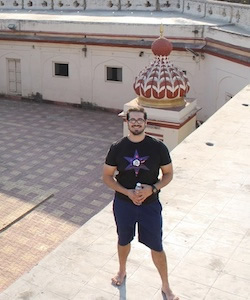When I tell people that I am part Indian, they always ask me what tribe I’m from. Just to clarify, I am Indian, not Native American. My mother is an Anglo-Indian and was born in Chennai, India. Being Anglo-Indian means that she has English blood in her which probably dates all the way back from when India was still under British rule. The whole story of British colonization in India and the independence movement led by Gandhi is very interesting. However, I’ve noticed that the consequences of British rule India has faced and still faces today are dug deep in the social atmosphere of the country. Since I am studying abroad in Pune, India, the easiest way to accomplish this is to examine the social attitudes people here have toward British rule.
This past Sunday, my host family took me on a trip to Sinhagad Fort, which is one of the three ancient military forts that sits on a hill (more like mountains) in Pune. Of course, we didn’t hike all the way up the hill, but more than two-thirds of the way up, my host father exited the car and invited me to walk the rest of the way up with him in an attempt to get some exercise. Our hike consisted of me taking multiple photos of the beautiful view and scenery during the breaks my host father took every five minutes. In an attempt to prolong these breaks to catch breathers, he would also provide a lot of commentary on the history of the fort, the hills, Pune, and even India. Something that he mentioned which interested me the most was that a lot of India’s wealth was stolen by the British, forcing India to become an undeveloped country. He also said that Indian culture was drastically affected by British rule. In short, he blamed British colonization for the shortcomings that India has faced and still faces today. This belief is not only shared by my host father, but, as I have noticed, it is a belief that a lot of Indians hold.
While walking on the streets of Pune, you can’t help but notice light-skinned faces. It is actually a rare spotting here in India. Out of all the foreigners I have met, I have yet to meet an English person. Most of the foreigners are from the United States, Germany, and France. I asked my host brother why this was, and he told me there is a slight distaste toward people with British accents and features. It is well-known that there were a lot of problems and tensions that existed during the time of British rule in India. Some Indians blame the British for most of the economic, social, and political problems that has plagued Indian history. Also, India was nearly thrown into chaos after its independence because of Muslim-Hindu tension and the formation of Pakistan. This is something people usually associate with discrimination in India along with its infamous caste system. However, there is also a discriminatory attitude toward those of British descent as well because of the past between England and India.
My mom’s family, as she had told me, was treated pretty badly and unfairly by their neighbors in Chennai solely because they were Anglo-Indian and Christian. Although, this was two decades ago and things have gotten a lot better. Because of this, I voluntarily choose not to include my British side when mentioning to people here that my mom is Indian. Hiding a part of my identity is something that I am not used to at all because in the United States I practically flaunt it. Now, I get a very small sense of how people from lower castes and Muslim descent must feel when a part of their identity, what makes them who they are, is also a factor on how they are treated in an environment like India. Discrimination in India, although outlawed, exists and in some cases is very apparent and outspoken.

